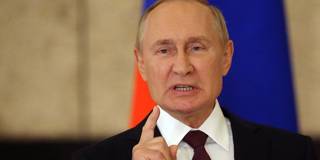Russian President Vladimir Putin has always followed a clear escalation formula: he withstands growing pressure for a while, but eventually he snaps. This record suggests that his decision not to respond forcefully to Ukraine’s incursion into Russia’s Kursk region should not be viewed as proof that his “red lines” are mere bluffs.
MOSCOW – This is not strictly a review of Sergey Radchenko’s recent book, To Run the World: The Kremlin’s Cold War Bid for Global Power. Rather, it is an invitation to find in the book a fresh take on the sources of Russian foreign-policy conduct, in line with the American diplomat George F. Kennan’s famous 1947 assessment of the “sources of Soviet conduct.” By focusing on the logic driving Soviet leaders’ foreign-policy decisions, Radchenko hopes to shed light on Russian President Vladimir Putin’s often-bloody quest to reclaim Russia’s status as a great power on par with the United States.

MOSCOW – This is not strictly a review of Sergey Radchenko’s recent book, To Run the World: The Kremlin’s Cold War Bid for Global Power. Rather, it is an invitation to find in the book a fresh take on the sources of Russian foreign-policy conduct, in line with the American diplomat George F. Kennan’s famous 1947 assessment of the “sources of Soviet conduct.” By focusing on the logic driving Soviet leaders’ foreign-policy decisions, Radchenko hopes to shed light on Russian President Vladimir Putin’s often-bloody quest to reclaim Russia’s status as a great power on par with the United States.